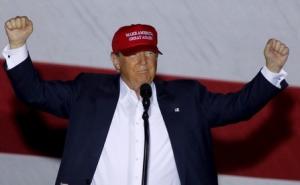Meet a man who will help determine Trump's fate in 2016 race
U.S. Republican presidential candidate Donald Trump reacts after being introduced at a campaign rally …
By Ginger Gibson and Emily Stephenson
(Reuters) - Mark Strang spends his days delivering farm equipment, listening to politics on the radio during cross-country drives. But in July, the 63-year-old could have an outsized voice in choosing the Republican nominee for president of the United States.
For the first time in 40 years, Republicans could arrive at their national convention in Cleveland without a nominee. If front-runner Donald Trump fails to lock up the nomination before then, as some pollsters are predicting, Strang will have a chance to make history.
Strang, from Illinois, is one of 2,472 delegates to the convention who will ultimately determine the party's choice for the White House this November. In recent elections, the delegates have simply rubberstamped the presumptive nominee. But this year the convention could become a brutal fight in which every delegate vote will count.
Trump currently has 673 delegates after winning a string of nominating contests, but if he wants to avoid a floor fight at the convention he needs the magic number of 1,237. There is some doubt among election number crunchers that he can hit it.
And that's when Strang will step into the spotlight. After filling roles in local Republican politics, Strang was selected by Illinois voters to serve as a delegate for Republican candidate U.S. Senator Ted Cruz, of Texas. He likes Cruz for his position on guns and immigration.
But if the convention becomes a fight because no candidate has the needed 1,237 delegates on the first round of voting, most of the delegates would eventually be released. States are still sorting through some rules governing how long delegates are bound to candidates. Strang said if he found himself a free agent, he would be open to switching his vote. (Graphic on how a contested convention works: http://tmsnrt.rs/1ROtOHw)
“I am going to be loyal to Ted Cruz, and I will stick with him until I see if there’s no hope. And if there’s no hope for Ted getting in, as I understand it I can pledge my votes to somebody else, and I would hope Ted would understand,” he said.
Interviews with Republican state party officials and some delegates who have already been selected reveal widespread soul-searching in anticipation of a potential fight. Officials and delegates described weighing their personal preference with the need to rally around a candidate going into the general election.
Party faithful are steeling themselves for a battle, not just for the nomination, but also for the party's core values.
Establishment Republicans deeply opposed to Trump's candidacy say he does not represent social and economic conservative values on healthcare, trade and the role of government in daily life.
Trump has built his campaign on anti-establishment rhetoric and promises to build a wall along the Mexican border to keep out illegal immigrants, impose a temporary ban on Muslims entering the United States and restore the country's manufacturing base.
A contested convention would pose a major test for Trump’s campaign, which thus far has eschewed a traditional grassroots organization. His rivals, Cruz and Ohio Governor John Kasich, are already trying to lobby delegates who might be open to changing sides once they are allowed to become free agents in the convention.
"A GREAT MISUNDERSTANDING"
In every state, the party chair and two national committee members, a man and a woman, are automatically selected to be delegates. But from there, state parties use a wide variety of procedures to pick delegates, most of whom won’t be named until late spring or summer.
“These are the base of the party,” said Michigan Republican Party chairwoman Ronna Romney McDaniel. “The delegates are not the establishment. They are the base. And I think that’s a great misunderstanding.”
Often sporting outfits with homemade decorated hats or jackets weighed down with dozens of buttons, delegates who show up every four years include everyone from lawmakers to homemakers, and from those who write million dollar checks to retirees who make phone calls.
Many states use small conventions to pick delegates, many of whom are long-time party activists and elected office holders. Not all of them personally back the candidate they are pledged to support in the first round of convention voting, said Virginia Republican Party chairman John Whitbeck.
“We have two former governors, a former attorney general, state senators, state House of Delegates members, party leaders, big and small and donors,” said Whitbeck.
In other states, such as Illinois, some delegates are elected by primary voters. In Ohio, which gives all its delegates to the statewide primary winner, candidates pick their own slate of convention representatives.
Jim Carns, a state representative from Alabama, where delegates are selected in the primaries, signed up to represent Trump last fall -- when many still viewed the rise of the New York real estate mogul as a temporary phenomenon.
He sees no circumstance in which he would switch candidates. But he knows there will be efforts to win over delegates by both the Trump camp and their opponents.
Once delegates are allowed to change their votes, some establishment figures have floated the potential to nominate someone who didn’t even run for president -- such as House of Representatives Speaker Paul Ryan.
But most of the 14 delegates interviewed by Reuters dismissed that as an option.
“I almost think that I would walk away from the Republican Party if they did that,” said Strang, the Illinois delegate. “If we’d wanted Paul Ryan, we would have drafted him. And I don’t dislike Paul Ryan, but he didn’t run.”
Ryan has said he is not interested in the presidency.
(Reporting by Emily Stephenson and Ginger Gibson, Editing by Ross Colvin)


No comments:
Post a Comment
Thanks for commenting. Your comments are needed for helping to improve the discussion.